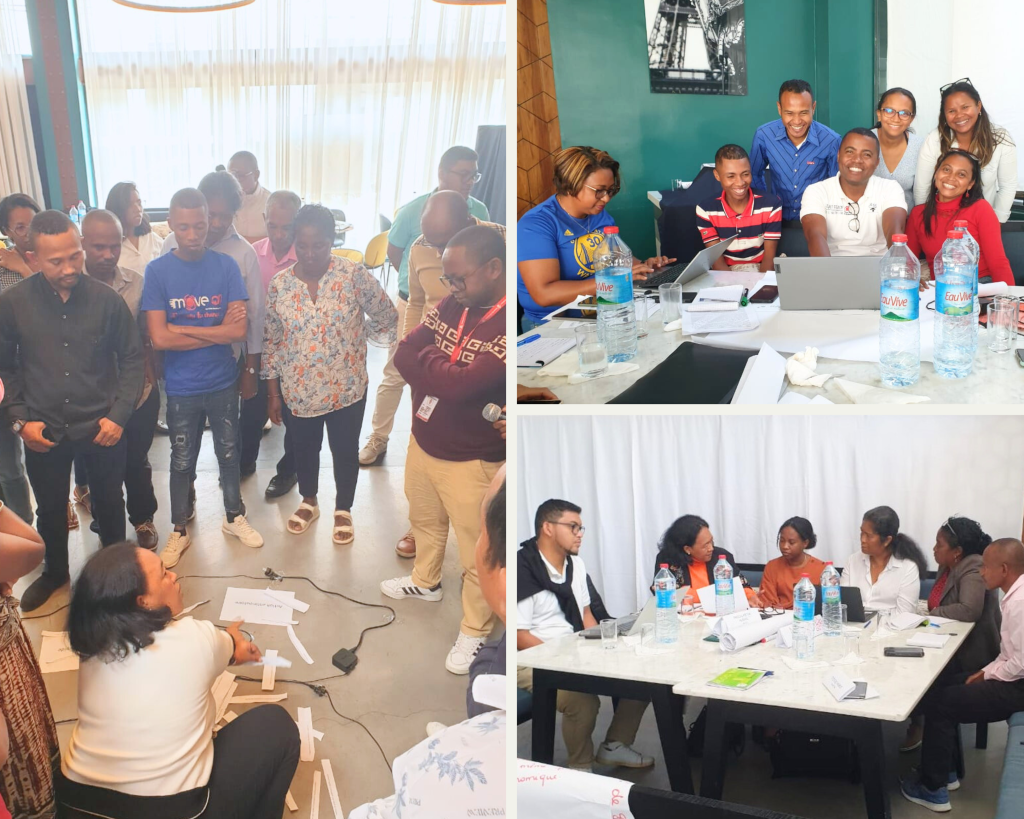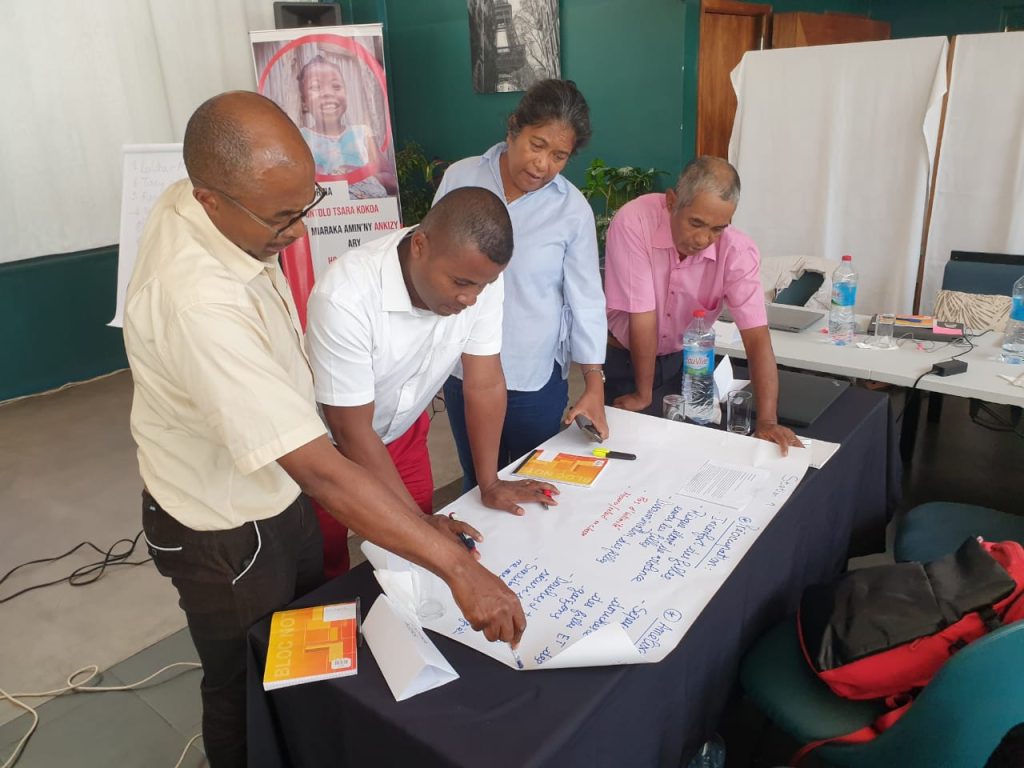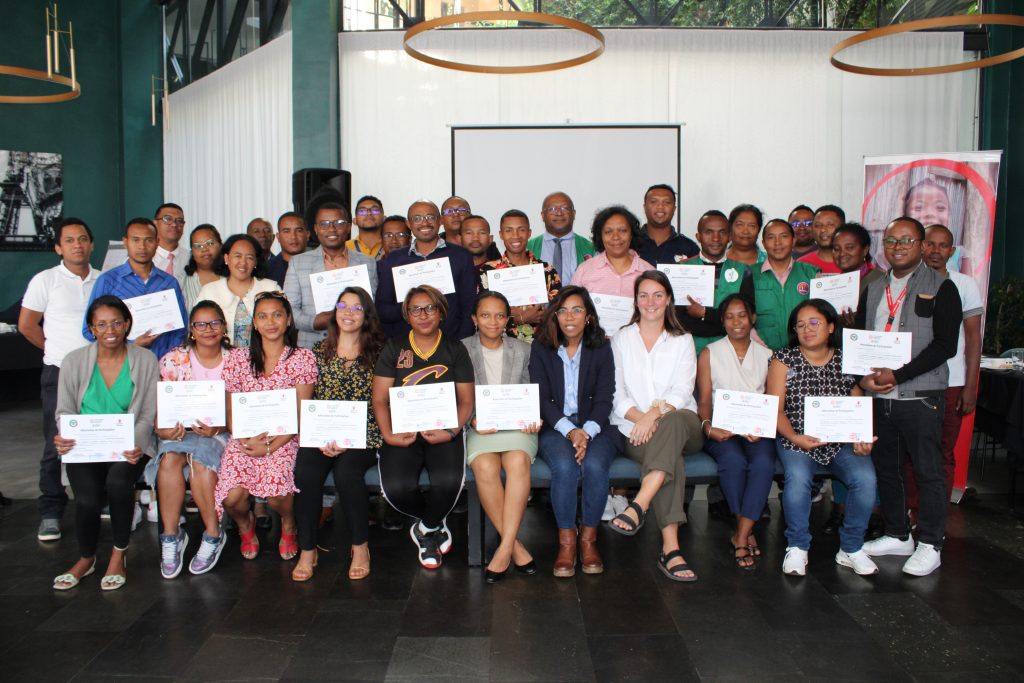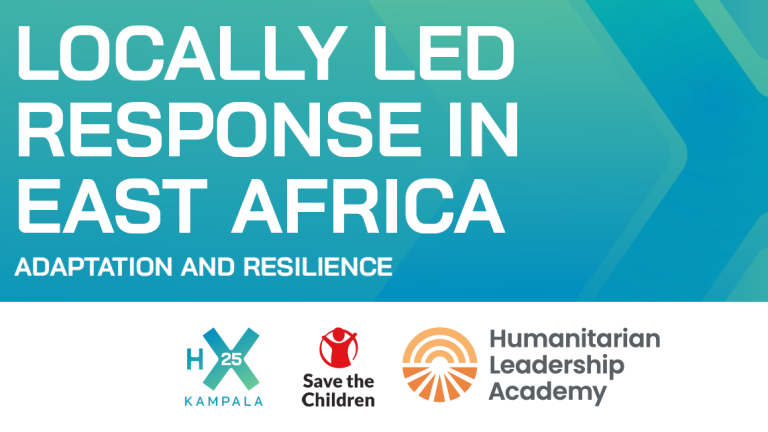In partnership with Save the Children Madagascar and the Ministry of Education of Madagascar, the Humanitarian Leadership Academy led a five-day Education in Emergencies (EiE) Fundamentals training in French for 34 participants in Antananarivo – Madagascar.
For the first time an EiE training course held in Madagascar with Save the Children who initiated the training along with the Ministry of Education of Madagascar.
Every year the cyclonic periods cause a major strain on the continuity of education in Madagascar. The Ministry of Education in line with their action plans for education in emergency situations, brought together partners including local NGOs, and the UN, representing all the regions to collectively develop responses for EiE. The EIE Fundamentals training was held at the end of September 2024.

The training was led by Mathilde Lemaire, EiE Professional Development Programme (PDP) Manager for West and Central Africa, and co-facilitated by Ravaka Ranivoarianja, Education Technical Assistant in the Democratic Republic of Congo. Ravaka originally from Madagascar, provided contextualised support including holding sessions in Malagasy, one of the official languages of Madagascar.
As a facilitator, Ravaka shared that: “Facilitating the EiE training session in Madagascar was a unique experience, particularly regarding the participants, some of whom are new to EiE. The training approach enabled participants at the beginning of the training to be at the same level of understanding of the different EiE concepts and then to work in teams through a simulation to identify and justify the EiE challenges, propose realistic solutions and advocate for the proposed approaches. The results were remarkable. Participants were able to grasp the problems of EiE caused by various hazards and their impact on children, the education system and the country, and the various possible solutions they came up with proved to be well suited to the context.”
The training featured a new format: 2 days of theory and 3 days of simulation. During the 2 days of theory, the main themes covered were: the fundamental concepts and frameworks of EiE; the physical and psychological protection and well-being of children in EiE; safety in schools and anticipatory actions in EiE. A new module was also tested: WASH in EiE.
Speaking on her experience, Christian Mara Razafimahefa from Association Faniry – a local NGO shared: “I was very interested in Module 1: ESU Fundamental Concepts and Frameworks and the WASH in EiE module. What really interested me was understanding the key words and their application.”
During the 3-day simulation, participants worked in groups to draw up an action plan to ensure the continuity of education following a cyclone or a long period of intense drought. The scenarios proposed were based on existing data, with the aim of representing the reality of Madagascar as closely as possible.
Ravaka added that: “the group simulation approach was also a way of showing participants the importance of involving different categories of people in identifying problems and finding more realistic solutions. The responses are thus local and appropriate to the context. It is vital to combine the trainer’s knowledge with actual experience of EiE when conducting this type of training, as adult participants are much more focused on the practical part of the training and tend to refer more to experience. This perception was borne out by their level of participation in relation to the 2 days of theory and the 3 days of simulation.”

Lila Norolalaina Randrianandrasana, Head of the Risk and Disaster Management Department, General Secretariat – Ministry of Education shared a reflection on the training: “I’m very happy to have taken part in this training course, which helped me to theorise our professional practices, provided new tools and put forward powerful questions to unlock hidden nuggets in terms of EiE, as well as a lot of exchanges, sharing, kindness and conviviality. These 5 days enabled me to take a fresh look at my role as administrator of Education in Emergencies. A real training-experience!”
The training was well received with earnest gratitude to the organisers and trainers. There was emphasis on the importance of collective responsibility and unity among organisations when working together in education in emergencies. Important learnings also emerged for all organisations in attendance particularly around unique challenges they individually face. For example, participants learned more about severe drought in the south of Madagascar away from the focus on cyclones and the damage they cause.
The training has given me a lot of inspiration on how we can improve our interventions. The exchanges and sharing with the trainers and the other participants enabled us to find out how everyone works to ensure continuity of education in emergency situations and, above all, to draw up ideas for action to be taken depending on the context of our intervention sites.”
Looking ahead, a summary of participants’ engagement will be compiled and shared with participants, Save the Children Madagascar, the Ministry of Education and the Bureau National de Gestion des Risques et des Catastrophes (BNGRC) (the National Office for Risk and Disaster Management) for potential future collaboration and action.



